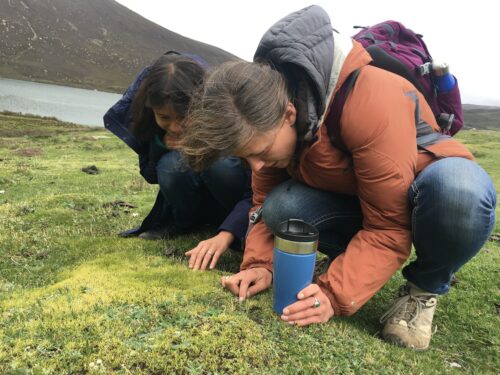
Kelly Hopping, an assistant professor in Human-Environment Systems within the College of Innovation and Design, came to Boise State in the fall of 2018 after finishing her post-doctoral work at Stanford University. Her research has focused on Tibet and Mongolia where she studied the effects of climate change and land use policies affecting peoples’ livelihoods.
Hopping recently published three new articles. Her research also was the subject of a feature story in The Atlantic.
Hopping’s article, “The demise of caterpillar fungus in the Himalayan region due to climate change and overharvesting,” in the Proceedings of the National Academy of Sciences, focuses on the Himalayan caterpillar fungus (Ophiocordyceps sinensis), a valuable biological commodity in demand as an ingredient in traditional Asian medicine.
Harvesting and selling caterpillar fungus is a crucial source of income for hundreds of thousands of collectors, but many are concerned about the sustainability of the practice. Hopping interviewed experienced caterpillar fungus collectors from across the Tibetan Plateau about their observations of why production of the fungus has decreased. The collectors blame habitat degradation, climate change, and over-harvesting. Hopping combined their observations with those reported in published studies from China, India, Nepal and Bhutan.
“Our statistical models corroborate that climate change is contributing to this decline,” wrote Hopping. “Our results underscore that harvesting is not the sole threat to economically valuable species, and that a collapse of the caterpillar fungus system under ongoing warming and high collection pressure would have serious implications throughout the Himalayan region…While ongoing climate change is likely to reduce caterpillar fungus production throughout its range, implementation of more sustainable management policies intended to counteract overexploitation will also reduce the amount available for legal collection. Both of these pathways toward reduced caterpillar fungus availability will limit people’s access to this highly valuable resource, thus underscoring the need for alternative livelihood options in the communities that depend on this niche commodity.”
Ed Yong, a staff science writer at The Atlantic, wrote an article on Hopping’s work, “The World’s Most Valuable Parasite is in Trouble: And so are the livelihoods of the people who depend on it.” The Atlantic published the piece on Oct. 22.
Two of Hopping’s recent articles focus on how yak grazing and climate change are affecting alpine meadow ecosystems in the Tibetan Plateau.
Global Change Biology published “Warming and land use change concurrently erode ecosystem services in Tibet.” Hopping’s research looks at the restriction of grazing in areas of the plateau based on an assumption that poor herding practices were responsible for grassland degradation. Combining an experimental approach and observational data, Hopping found that grazing actually maintains a healthy ecosystem that provides forage for livestock and wildlife while storing more carbon in the soil. The warming climate, she found, was the culprit causing harm to the ecosystem.
Hopping wrote, “When yaks were removed (to simulate a grazing ban), woody shrub growth took off in response to warming. These findings have significant ecological and policy implications. The grasslands store a lot of carbon in their soil, but this decreases with degradation and even more so when shrubs become the dominant plant. If the Tibetan Plateau ecosystem starts releasing this soil carbon into the atmosphere or is less able to suck up CO2 through the plants (via photosynthesis; as we found in degraded meadows) then this would contribute to more CO2 in the atmosphere, acting as a greenhouse gas and thus promoting further climate warming. Moreover, the shift to degraded or shrub-dominated meadows means a loss of food for livestock, and thereby for the herder families who depend on them.”
Hopping and her collaborators concluded that “policies targeted at reducing grazing will do little to ameliorate the undesirable effects of climate warming on central Tibet’s alpine meadows, and the greater risk is that livestock removal will undermine contemporary pastoral livelihoods and exacerbate local communities’ vulnerability to the impacts of climate change.”
Hopping’s third article, “Grazing and spring snow counteract the effects of warming on an alpine plant community in Tibet through effects on the dominant species” in the journal Agricultural and Forest Meteorology focuses on how plant diversity responds to climate change and grazing.